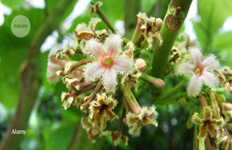

2nd December 2022 (7 Topics)
Context
In a recent study in Vienna it has been found that alien plants introduced by colonial powers from their native lands has led to ‘destruction’ of other plant species in the region affected.
Key Findings of the Study:
- Colonial Powers dominated the transfer of plant species across the world includes; the British, the Spanish, the Portuguese and the Dutch.
- Source: The team evaluated a database of naturalised alien plants called ‘GloNAF’ to determine patterns of similarity or diversity in the distribution of these plants.
|
GloNAF:
|
- They found that parts of the world colonised by the same power had more similar flora than those that were unoccupied or ruled by a different power.
- Although alien plants were naturalised for their economic value, the phenomenon has taken a toll on the biodiversity and economy of colonised countries.
What are Alien Species?
- An alien species is a species introduced outside its normal distribution.
- According to experts, alien species become ‘invasive’ when they are introduced deliberately or accidentally outside their natural areas, where they out-compete the native species and upset the ecological balance.
- The most common characteristics of invasive species are;
- Rapid reproduction and growth
- High dispersal ability
- Ability to survive on various food types, and in a wide range of environmental conditions
- The ability to adapt physiologically to new conditions (called phenotypic plasticity)

Why they are considered harmful?
- Reactive impact: The alien invasive species are non-native to an ecosystem. They may cause economic or environmental harm or even adversely affect human health.
- Further intensification of impact: The negative effects of invasive alien species on biodiversity can be intensified by climate change, habitat destruction and pollution.
- Isolated ecosystems such as islands are particularly affected.
- Impact of well-being: Loss of biodiversity further have major consequences on human well-being. This includes the decline of food diversity, leading to malnutrition, famine and disease, especially in developing countries.
- It will also have an important impact on our economy and culture.
Impacts:
- Economic impact: Their negative impact on the economy costs countries billions of dollars in losses to agricultural production annually.
- Environmental Impact: Invasive species leads to affect the native species and can degrade ecology of the region.
- Cultural impact: The People of the region where alien species were introduced also adopts with the plant which affect the consumption and living pattern of a region with time.
|
Important Alien species brought in India during Colonial era:
|


